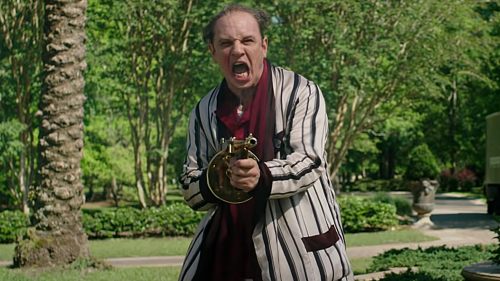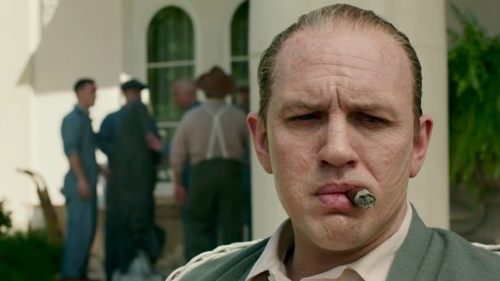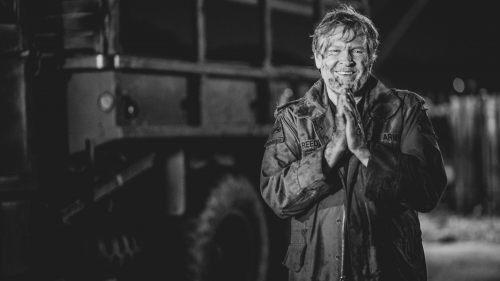The BMD Interview: CAPONE Director Josh Trank
WARNING: The following interview contains spoilers for Josh Trank's CAPONE.
BMD: I guess my first question is, why even make a movie like this?
Josh Trank: There's many different answers. There's a personal answer - as in, how the movie came to me - and I've told that story a number of times at this point. But as I've been talking more about the origin of it, I think that there might be a difference between where an idea comes from and why you might commit to it.
Right on.
So, the reason why anybody would make a movie like this, in this way, is to challenge convention. There's some viewers who love convention, and that's not a bad thing! You need convention, in all aspects of life. It gives us a sense of equilibrium. You need great conventional movies so you can also have unconventional movies, like FONZO. But, the fewer unconventional films are being made, the more strongly somebody like me is gonna feel about making those unconventional choices, and in the most extreme ways possible. It's to alert other people that they can and should follow their instincts to buck convention, as well.
Tom Hardy strikes me as the kinda guy who was probably all-in on this approach from the beginning.
Well, when I finished this script, I had a concern about the number of shits [Capone has onscreen]. And I heard from my producer that Tom Hardy had read and really loved the script, and I was like, "OK, great." But still - I hadn't talked to Tom at that point. We didn't have any friends in common who I could call up and be like, "So, what's Tom's vibe? Is he an exploratory artist?" I didn't know. But I just kept thinking about the shits, and I prepared myself beforehand that Tom would probably want one of the shits removed. But what I learned is that Tom Hardy cannot shit his pants enough [onscreen].
That's what I love about Tom. He's there for it. He is all for the madness. He's all for the surreal. He's all for the vulnerability on display. The way I like to think of Tom is, he's the kind of actor who commands such power and simultaneously can make himself seem so powerless. I don't know any other actor who can do it quite like Tom can.

He certainly brought that blend of vulnerability and power to Mad Max.
What I really loved about Tom's Max is that you really got the feeling that this is an eccentric guy, a loner. Mel Gibson's Max is dope, no question there. He's the template, and that's Mad Max. But Mel Gibson's Max also seems more "cool' than like a loner. You don't meet cool loners in real life - or if you do, that's very rare. Mel's Max you can imagine having friends, having a life before all this. Tom's Max is somebody who was meant to be alone this whole time. And he's fine with it! He's just a weird guy. Not in any specific way, just behaviorally. The way he interacts with [Immortan Joe's wives] and Charlize's Furiosa is off-putting and weird, but in a naturalistic way. But also, you can tell he has a heart, y'know? Tom is able to take a character who's basically on a ride for the entire movie - there's no lengthy character-development scene for Max in FURY ROAD - and Tom fills him with these idiosyncratic behavioral traits that make it more than just some guy wearing a costume and playing action hero.
And vulnerability must've been a huge consideration for CAPONE.
Yeah. That low-angle, wide lens, towering image of Robert De Niro, smashing people in the head with a baseball bat in THE UNTOUCHABLES - that's what we think of when we think of Al Capone. There's no vulnerability on display there, because he's behaving in a way that elicits fear and respect. He wants people to know he will kill them if they question him, or doubt him, or make him look silly in front of other people. The Al Capone Tom's playing in this movie is physically weak. He wouldn't be able to defend himself in any real way in those same situations. So, when he's sitting there listening to a radio play about Al Capone and the St. Valentine's Day Massacre, he feels fear. He's afraid of what he's hearing, because he couldn't survive that situation [in his current state].

To put it mildly, responses to the film have been divisive. I have to assume that everyone involved knew that'd be the case.
Yeah. I mean, everyone signed off on this movie. They knew what it was. It was right there on paper - I'll send you the script, you'll see. It's all there, in often very descriptive ways (laughs). I don't think you read a script like FONZO and not understand that it's not an action movie. I showed my filmmaker friends this movie months ago, and the response was pretty much the same across the board: they were like, "I just think it's crazy this movie exists." And I agree! I think it's crazy this movie exists. I still can't believe we actually got this specific movie made, with a budget and with that cast, and now it's a movie. It exists, it's out there, people can watch it.
On a surface level - an Al Capone movie starring Tom Hardy, with Linda Cardellini and Matt Dillon and Kyle MacLachlan and Peter Demming - that movie could be any number of things. One version of this is a prestige Oscar movie, y'know? But what we made is not a prestige Oscar movie, nor was that ever the goal. As a filmmaker, I'm less interested in winning an award than making the kind of movie I'd never seen before. And furthermore, if you set out to make a prestige Oscar movie, I think you're limiting the influence you might have on future filmmakers who might someday, when I'm older, be making the kind of weird movies I want to watch, y'know?
Movies that catch me off-guard or rattle my cage a little bit - if only because they're not what I was expecting! - are always my favorite kind of movies. Every time. So much of what I see anymore feels very predictable or commercially-minded. I tend to think of those movies in those terms versus, say, chasing an Oscar.
When I go off to make a movie, I have to know what movie I'm not making, even more so than the kind of movie I am making. That's important. And a lot of the time, when I hear other filmmakers talking about the craft, it's almost in terms of objective goals. I don't agree with that point of view. I think filmmaking is a very personal pursuit, just like any other creative endeavor, and I want to be able to trust my gut in terms of "Why am I making this movie?", as opposed to "What am I going to get out of the movie when it's over?"
It's a broad question, y'know: why make this movie? But it's also very specific. What am I trying to get out of this movie? The satisfaction of contributing something unique, that's bucking convention, that has themes that are extremely personal to me on some level. I don't think that's any different from many other filmmakers I grew up looking up to. I want to be clear that I'm not out here saying I'm unlike any other filmmaker, or better than any other filmmaker. Totally not the case. All I'm saying is, I'm inspired by filmmakers who don't think about the objective goals of making quote-unquote "good movies", or Oscar-winning movies for the industry.

What genre do you classify this movie within?
(long pause) That's a good question. (Long pause continues)
Gun to your head, and you've gotta place it in a section at Blockbuster.
I'm only hesitating because, well, it's hard - I think less in terms of genres than in filmmakers. For instance, if you ask me what genre a John Carpenter movie is, I'm gonna be like, "Well, it's a John Carpenter Movie". I'm not thinking of Carpenter being beholden to whatever genre he's working in, whether that be action or science fiction or whatever. What genre would CHRONICLE fall into? Drama? I guess that's what you'd call FONZO - a surrealist drama, maybe? That question might be easier for some people--
I don't think it's an easy question at all, not for this movie.
I mean, my all-time favorite movie is BARTON FINK. What would you even call BARTON FINK, y'know? What about FAST TIMES AT RIDGEMONT HIGH? I don't know that you can only classify that as a comedy, because it's also dealing with some pretty serious shit, and in a way that comes across very grounded and naturalistic. That feels more like a drama to me. A lot of conversations about movies are genre-first, which has this underlying feel of, "Well, for me to really know how I should enjoy this movie, tell me what genre of movie it is first." Is it a gangster movie? Well, then you're setting up certain requirements of that genre, and that could impact your enjoyment of the movie.
It's funny you say that, because when the screener came in, I asked my wife if she wanted to watch a movie with me. What movie? CAPONE. She was like, "Oh, it's a gangster thing?" And I said, "Weeeell, kinda, but I gather it's an unusual one." My wife doesn't like gangster movies, but she sat down on the couch, anyway, with her phone out. Within ten minutes or so the phone was down, and she was in it 'til the end. She enjoyed it as much as I did.
That's awesome!
The interesting thing was that, afterward, she was like, "That wasn't really a gangster movie, was it? That's a horror movie." And that started a whole debate about what CAPONE is.
Y'know, someone who's done this really successfully, who I just have massive respect for, is Jordan Peele. In an overt way, US qualifies as a horror movie because it's really fucking scary. When I saw it, I was terrified. But it's also science fiction, fantasy, surrealism, comedy. That's one of my favorite movies of the past 10 years, it's just crazy. And one of the things that really worked for US, and which allowed it to become a blockbuster hit, was the sense of horror was sustained through the whole thing. So, when you get to the third act - where all the bigger, science-fictiony, "Hands Across America" elements get introduced - people were by then already well hooked into the horror aspect and willing to go along with it. Through all that, Jordan was able to explore a lot of deep, metaphorical themes. Marginalized people. People in society who we ignore. This idea of a Bizarro World version of ourselves lurking out there somewhere. That's a complicated movie with a lot of big ideas in it, and yet it performed like a blockbuster, standard horror movie. It's a Trojan Horse of art inside of that movie. I just love how he did that.
But how would I classify US? I'm not sure, because of the ways that it bucks against convention. It's funny, it's scary, it's dramatic, there's these interesting romantic ideas being explored ... Edgar Wright's like this, too. I don't know how to classify Edgar's movies into genres because they're so specific to his sensibilities as a filmmaker. Comedy, action, but also very believable human drama and stakes. Like, SHAUN OF THE DEAD is very grounded. By the end of that movie, you want to die for [Nick Frost and Simon Pegg's friendship], too. You're with them! These are filmmakers I feel transcend genre conversations.
I don't know what I am, or if I fall into any particular genre. This is my third movie, but in a way I feel like it's actually my second movie. CHRONICLE was the movie I wanted to make. FONZO was the movie I wanted to make. The only different thing is that they ended up calling it CAPONE, which I'm fine with now. But it's exactly the movie I wrote and dreamed of making. So, I'm going on a path where I never want to repeat myself. There might be some similarities in a sense between CHRONICLE and CAPONE - just in terms of bucking convention, human drama, and dealing with an unraveling or descent - but as far as subject matter and who's gonna watch it? Very different. And the next thing I do will be different in that way, as well.

I would like to run a CAPONE fan theory by you.
Sure!
The movie contains a number of dangling plot threads, one of which concerns $10m which Capone may or may not have hidden somewhere on his property. I think I know where that money is, but I guess my first question should be: does that missing money actually exist?
In my mind, the money does exist.
Is it in the statue that looks like a dick?
He thinks it's in the dick statue--
YES. I FUCKIN' KNEW IT.
--but it's not actually in the dick statue.
Aw.
Yeah, I don't think it's actually in the dick statue.
But that's why he's so protective about that one statue.
Correct!
Was the statue supposed to look like a dick?
Yeah. Early on when you see the statue, it's very phallic from one angle. But at the end of the movie, when the movers are hoisting it onto a trolley, you see the flip side - it's this poor, motherly figure who's crouched down protecting these babies from a giant boulder that's being held on her shoulders. Which, in its own way, is kind of a metaphor for the movie. But, yeah, definitely it's intended to look like a dick and balls. This was just one of two things I just didn't make clear enough in the edit.
What's the other one?
Well, it has to do with the introduction of Matt Dillon's character.
Ah, yes. There's been some confusion about why he'd be introduced mid-sex scene in another location if the character exists entirely within Capone's mind.
Yeah, see, it all ties back to the radio. When we introduce Dillon's character in the movie, he's having sex in his apartment and there's music playing, Pachelbel's Canon in D. This is the same song that's playing on the radio in the scene before, when Fonz is staring out onto the lake. The music carries over into Matt Dillon's apartment, and that whole scene occurs. Then we go back to Fonz, who's still out on the patio listening to the radio, and we hear the continuation of that very scene as part of the radio play.
Yeah, I definitely didn't catch that.
It's very easy to miss! It's not a clean transition, I know, but if we'd made the conversation carry over exactly via the radio, it would've made the whole thing more direct. It would've been more apparent. I think it would've tipped our hat a little too early and had people figuring out what was going on with Dillon's character. It's purposefully subtle, but it is perhaps a little too subtle. But hopefully this is a movie where, if you liked it, you'll watch it a few times and pick up on some of that stuff. Here's another little piece of trivia--
Hit me.
Every voice you hear on the radio is my voice. And most of the voices on the phone.

Guess my last question is: what're you doing next?
Well, I've been working really, really hard for a long time on this 10-part limited series that ... well, I don't wanna be too specific about the details just yet, because it's a true story that happened in the early days of the CIA after World War II, and deals with the United States' involvement in Cuba. It revolves around two key players who I haven't really seen anyone really talking about. I think only one book's been written about them. So, I don't really want to reveal too much now because I don't want anyone else to run with it [laughs]. But it's something Tom and I are very, very excited about--
Oh, so you'd be working with Tom Hardy again on this?
Yeah, he's very involved in it alongside me. I'd been working on it on my own for many years, and then I told Tom about it and he really clicked with it. So, that's something we're collaborating on. Other than that, I'm working on a heavy handful of projects - some features, some series-based. None of 'em are really in a place where I could say what they are yet, though. The pretentious answer is that, like a painter, I don't wanna reveal the painting 'til it's done.
-----------------------
CAPONE is out now on all major VOD platforms, distributed by Vertical Entertainment.



